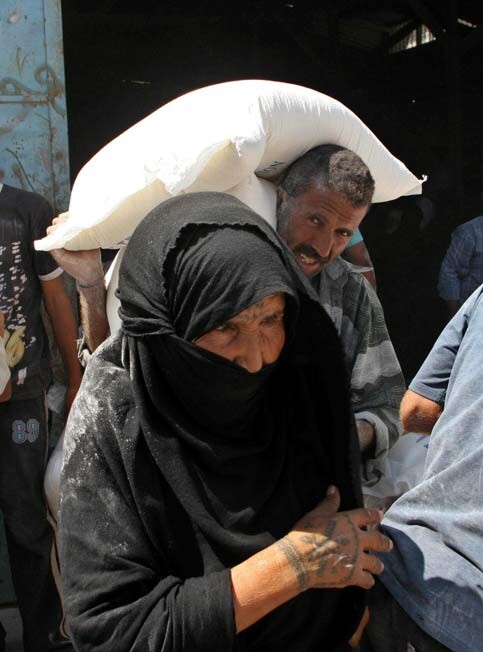United Nations News Service 22 February 2007

Palestinians getting aid from the United Nations Relief Works Agency for Palestinian refugees in Rafah, southern Gaza, September 18, 2006. (MaanImages/Hatem Omar)
22 February 2007 - Rising unemployment, poverty and “economic suffocation” in the occupied Palestinian territory are posing acute challenges to food security, leaving many families entirely dependent on outside aid as well as threatening vital sectors of the Palestinian economy, United Nations agencies warned today.
“The poorest families are now living a meagre existence totally reliant on assistance, with no electricity or heating and eating food prepared with water from bad sources. This is putting their long-term health at risk,” UN World Food Programme territory Director Arnold Vercken said.
The warning comes in a report by the WFP and the UN Food and Agriculture Organization (FAO) due to be released this month, reviewing and analyzing 2006 statistics and assessing food security and socio-economic conditions in the West Bank and Gaza Strip.
The report illustrates how restrictions on trade and movement last year led to the progressive fragmentation of the economy, dragging previously self-reliant sectors of society such as farmers, workers, fishermen, traders and small shop owners into poverty and debt.
Ever since Hamas, which refuses to recognize Israel, won elections early last year and formed a Government, Israel stopped handing over tax and customs revenues it collects on behalf of the Palestine Authority, and international donors suspended direct aid, calling on Hamas to commit to non-violence, recognize its neighbour and accept previously signed agreements between Israel and the Palestinians.
Gaza relies almost entirely on imported food, thus any closure of the Karni commercial crossing, which Israel has often imposed for security reasons, has a direct impact on the availability and price of basic commodities. The stagnation of trade last year drastically affected employment and income opportunities throughout the Gaza Strip, leading to a serious rise in poverty.
While food security levels in the territory have been maintained through regular humanitarian aid and strong social solidarity among Palestinians, almost half the population of some 4 million remains food insecure or is at risk of becoming food insecure, according to the report.
The weakening economy is leading to a marked decline in living standards, with 84 per cent of Gazans and 60 per cent of West Bankers reducing their living expenditures by the end of 2006. Many people, who cannot afford to buy food, have been forced to sell off valuable livelihood assets such as land or tools.
One particularly disturbing factor noted by the report is the growing proportion of urban dwellers suffering food insecurity, alongside the more traditionally vulnerable rural and refugee populations. All Palestinians are to a greater or lesser extent caught between rising food prices and declining purchasing power.
“In recent years, Palestinians have shared the burden of rising poverty, but without sustainable economic recovery, the humanitarian caseload will only increase over time,” FAO Food Security Advisor Erminio Sacco said. “Food assistance alone cannot prevent this decline. There also has to be economic growth which requires political dialogue and stability.”
WFP originally planned to provide 154,000 tons of food to 480,000 Palestinians, but since various restrictions were placed on international funding to the Palestinian Authority in January 2006, the agency has responded to growing needs by raising the total to 600,000.
Related Links